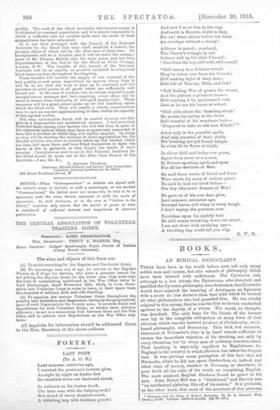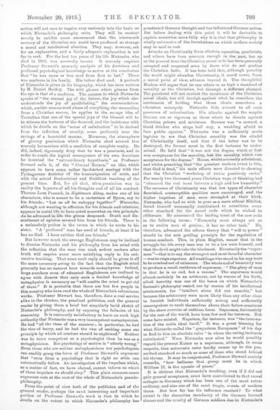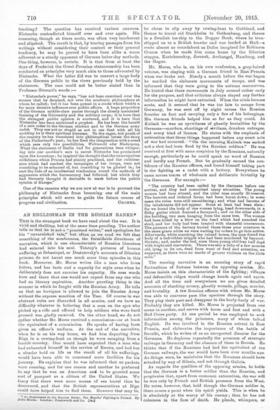BOOKS.
AN ETHICAL ICONOCLAST.* THERE have been in the world before now, not only marry selfish men and women, but also schools of philosophy which have been tainted with selfishness. The Cyrenaies and, although to a less extent, the Epicureans, who absorbed and qualified the Cyrenaic philosophy, were hedonists; but Nietzsche would have rejected the teaching of Aristippus or Epicurus with a scorn no lees decisive than that with which be treated all other philosophers who bad preceded him. He was wholly original to this extent, that be was the first to elevate unabashed egotism to the dignity of a virtue. The world, he thought, was decadent. The only hope for the future of the human race lay in the complete extirpation of every form of that altruism which was the bastard product of Christianity, weak. kneed philosophy, and democracy. This bald, but accurate, statement of Nietzsche's aims is in itself almost sufficient to ensure the immediate rejection of his teaching, not only by every Christian, but by every man of ordinary common-sense. That teaching' is especially repellent to Englishmen, for England is the country in which altruism has taken the deepest root. It was perhaps some perception of this fact that led Nietzsche, albeit be did not spare Junk erdom, or, indeed, any other class of society, whether in Germany or elsewhere, to pour forth all the vials of his wrath on everything English. The most eminent English thinkers found no grace in his eyes, John Stuart Mill was a "blockhead," and Darwin was "an intellectual plebeian, like all of his nation." It is probable, on the other hand, that most of the members of this plebeian • Nietzsche and the I,kale of Modern Quernanv. By H. L. Stewart, M.A. (Oxen.), D,Ph. Loudon ; Edward Arnold, Va. lid, mt.], nation will not care to inquire very curiously into the basis on which Nietzsche's philosophy rests. They will be content merely to exhibit some amazement that the nineteenth century of the Christian era could have produced so strange a moral and intellectual abortion. They may, however, ask for en explanation, and a fairly adequate explanation is not far to seek. For the last ten years of his life Nietzsche. who died in 1900, was avowedly insane. It scarcely requires Professor Stewart's masterly analysis of his doctrines and profound psychological knowledge to arrive at the conclusion that "he was more or less mad from first to last." There was madness in his family. His father died mad. A. portrait of Nietzsche is given in his biography, which has been written by M. Daniel Etalevy. The wild glance which gleams from the eye is that of u madman. The manner in which Nietzsche speaks of " the eternal joy of the future, the joy which also understands the joy of annihilating," the commendation whioh, amidst unmeasured abuse of everything else emanating from a Christian source, he applies to the savage idea of Tertullian that one of the special joys of the blessed will be to witness the tortures of the dimmed, and the insistence with which he dwells on the "sense of satisfaction" to be derived from the infliction of cruelty, come perilously near the ravings of a homicidal maniac. Moreover, the atmosphere of gloomy pessimism which Nietzsche shed around him scarcely harmonizes with a condition of complete sanity. He did, indeed, vigorously deny that he was a pessimist. and iu order to evade the logical consequence of his own doctrines ho invented the "extraordinary hypothesis," as Professor Stewart calls it, of the " Eternal Return," an idea which appears to have some rather far-fetched analogy with the Pythagorean doctrine of the transmigration of souls, and with the actual Bre,hminical and Buddhist teaching of the present time. But, for all that, ultra-pessimism was in reality the keynote of all his thoughts and of all his conduct. Thomas Love Peacock, in Nightmare Abbey, makes one of his characters, who is meant to be a caricature of Byron, say to his friends : "Let us all be unhappy together." Nietzsche, although not wanting in affection for his Irian& and relations, appears in social life to have acted somewhat on this principle. As he advanced in life the gloom deepened. Death and die- sentiment of opinion severed him from his friends. There is a melancholy pathos in the terms in which he wrote to his sister. " A ' profound' man has need of friends, at least if he has no God. I have neither God nor friends."
But however much the average Englishman may be inclined to dismiss Nietzsche and his philosophy from his mind with the reflection that the man was mad% ardent seekers after truth will require some more satisfying reply to his sub- versive teaching. That some such reply should be given is all the more necessary owing to the fact that the English mind generally has no natural bent towards metaphysics. Indeed, large numbers even of educated Englishmen are inclined to agree with Jowett that only such a limited knowledge of metaphysics is necessary as "will enable the mind to get rid of them." It is probable that there are but few people in this country who have read the whole of Nietzsche's voluminous works. Professor Stewart has, therefore, done a real service alike to the thinker, the practical politician, and the general reader by giving them a brief but singularly lucid sketch of Nietzsche's philosophy, and by exposing the fallacies of his reasoning. It is eminently satisfactory to learn on such high authority that Nietzsche was a very incompetent metaphysician. Re had " all the vices of the amateur ; in particular, he had the vice of hurry, and he had the vice of seeking some one principle by which all conduct should be explained." Neither was he more competent as a psychologist than he was as a metaphysician. His psychology of motive is " utterly wrong." Even those who are neither metaphysicians nor psychologists can readily grasp the force of Professor Stewart's argument that "even from a psychology that is right no ethic can automatically follow. An investigation of the impulses which, as a matter of fact, we have obeyed, cannot inform us which of these impulses we should obey." This plain common-sense argument cuts at the root of the whole of Nietzsche's pseudo- philosophy.
From the point of view both of the politician and of the general reader, perhaps the most interesting and important portion of Professor Stewart'e work is that in which he dwells on the extent to which Nietzsche's philosophy has penetrated German thought and has influenced German action. But before dealing with this point it will be desirable to explain somewhat more fully why it is that that philosophy is wholly subversive of the foundations on which modern society may be said to rest.
Attacks on Christianity from atheists, agnostics, pantheists, and others have been common enough in the past, but up to the present time the Christian moral code bite been generally accepted and respected even by those who do not profess the Christian faith, It has been held that, although possibly the world might abandon Christianity, it could never, from a moral point of view, advance beyond it. The thoughtful Moslem will argue that he can attain to as high a, standard of morality as the Christian, but through a different channel, The pantheist will not contest the excellence of the Christian moral ideals, but will inveigh against what he considers the intolerance of holding that those ideals constitute a Christian monopoly. Nietzsche bids avaunt to all such processes of ratiocination. His attacks against the sceptics Stratum are as vigorous as those which he directs against Christian priests and ministers. Strauss was "a coward, a timid thinker who stops half way, a weakling afraid to face public opinion." Nietzsche was a sufficiently acute logician to see that Christian morality was the citadel of Christianity itself, and that if the latter was to be destroyed, the former must in the first instance be under- mined. He held that " it was not the dogma which at first won acceptance for the morality, but the morality which won acceptance for the dogma." Hence, whilst avowedly atheistical, and svhilet preaching that "the greatest modern event is this, that God is dead," his main efforts were directed to showing that the Christian "workshop of virtue positively reeks." For nearly two thousand years Christian ways of thinking had "obscured the real issue between a high and low humanity." The outcome of Christianity was that low types of character flourished, contemptible qualities were encouraged, and the higher impulses of man were strangled at their birth. Nietzsche, who had no wish to pose as a mere ethical Nihilist, found himself necessarily constrained to substitute some other standard for the moral code which he wished to obliterate. He announced the leading tenet of the new code in the following terms: "Humanity must always act so as to evolve men of genius; it has no other task." He, therefore, advocated the odious theory that " will to power" should be the sole guiding principle for the regulation of human conduct. This, in plain English, meant that in the struggle for life every man was to be a law unto himself, and that the devil might take the hindmost. Eventually the "super. man "—that is to say. the strongest and most forceful character —was to reign supreme. All weaklings who stood in his way were to be crushed out of existence. The whole end of humanity was to produce a small residuum of supermen. e The glory of man is that he is no end, but a means." The superman would almost certainly be an aristocrat, not by reason of his birth, albeit heredity was one of the bases on which Nietzsche's fantastic philosophy rested, nor by reason of his intellectual attainments, for "intellect alone did not ennoble," but because the aristocracy were more likely than any other class to furnish individuals sufficiently strong and sufficiently unscrupulous to exalt themselves above their fellow-areatures by the sheer exercise of ruthless totem. Supermen, fortunately for the rest, of the world, have been few and far between. But some have existed. Napoleon. for instance, was •• the incarna- tion of the noble ideal itself." It was a great blessing for what Nietzsche called the " gregarious Europeans" of hie day to find in him an absolute ruler "in whom the ruling instincts oulminated." Were Nietzsche now alive he would possibly regard the present Kaiser as a superman, although, in some respects, that autocratic ruler hardly comes up to the pre. scribed standard so much as some of those who stand behind his throne. It may be conjectured, Professor Stewart acutely remarks, " how bellicose that group must be iu which William II. is the apostle of peace."
It is obvious that Nietzsche's teaching, even if it did not gain general acceptance, must have contributed to that moral collapse in Germany which has been one of the most extra- ordinary, and also one of the most tragic, events of modern times. But how far has his influence reached P To what extent is the shameless mendacity of the German learned classes and the cruelty of German soldiers dike to Nietzsche's
teaching ? The question has received various answers. Nietzsche contradicted himself over and over again. His reasoning, though at times acute, was often very incoherent and slipshod. The result is that, by tearing passages from his writings without considering their context or their general tendency, he may be proved to have been alike a warm adherent or a sturdy opponent of German latter-day methods. One thing, however, is certain. It is that from at least the days of Frederick the Great Prussian statesmanship has been conducted on principles very much akin to those advocated by Nietzsche. What the latter did was to convert a large body of the German public to the views previously held by the
statesmen. The case could not be better stated than in Professor Stewart's words :-
s' Nietzsehe's power," he says, has not been exercised over the masses that he despised, nor over the academic philosophers at whom he railed; but it has been potent in a circle which wields a far more decisive influence over public affairs. A huge proportion of the German middle-class passes through the closely associated training of the University and the military corps; it is here that the strongest public opinion is nurtured, and it is here that Nietzsche bee been acclaimed a prophet. He has been the herald of a new order to the German student and to the German army cadet. They are not so stupid as not to see that with all his scolding he is their spirituel kinsman. To the eager, hot youth of the country he has translated into philosophical terms the story of the Fatherland's past; he has fired the imagination with a creed which sees only two possibilities, Mit:nada oder Niedergang. What the statesmen of Berlin had for generations been whisper- ing into one another's ears in secret Nietzsche has proclaimed upon the housetops ; he inspired the thought that the unscrupulous selfishness which Prussia had plainly practised, and the ruthless- ness which had marked the campaign, of her troops, were not something to be ashamed of, but something to be gloried in ; he cast the halo of an intellectual vindication round the methods of aggression which the bureaucracy had followed, but which they had formerly thought it desirable to meek before the public opinion of Europe,' One of the reasons why we are now at war is to prevent the philosophy of Nietzsche from becoming one of the main principles which will serve to guide the future course of
















































 Previous page
Previous page